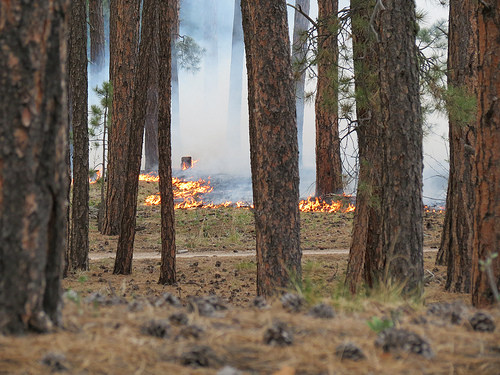
Two consecutive years of death and destruction from Colorado's wildfire season has renewed the focus on ways to mitigate property damage and stay physically safe if you live in a wildfire-prone area. But perhaps less talked about is how to navigate feelings of stress, anxiety and sadness from being personally affected by wildfire danger, or from the constant news reports of fellow Coloradans in suffering.
Tips on coping with the emotional strains of natural disasters might be especially welcome from people living in or near Colorado Springs. After seeing destruction from wildfire earlier this summer, residents later found themselves fending off dangers from flooding and mudslides.
So how do you cope with the hum of a constant threat? We put the question to the Reverend Nathan Mesnikoff. He’s chaplain at Memorial Hospital in Colorado Springs and he works with victims of natural disasters. He also helps the helpers -- counseling the doctors, nurses, and first responders. During the Black Forest Fire, Mesnikoff penned the tips listed below (originally published by the Colorado Springs Independent) for maintaining some peace of mind. He talks more about his tips for coping and sheds light on what makes our processing of nature's threats in Colorado translate into stress.
A blaze engulfs an area of trees as part of the Black Forest Fire. The deadly wildfire devastated communities earlier this summer near Colorado Springs. Credit: Alex Chambers.
Tips: Coping with Emotional Strain of Wildfires & Other Disasters in Colorado
By Rev. Nathan Mesnikoff, Memorial Hospital
- Be as patient and compassionate as you can with family, friends, and yourself.
- Spend time talking with good friends, clergy or counselors. We all need to process stressful events, and talking or writing about them in a journal, for example, can be very helpful.
- Eat well, rest when you can, get and give hugs, and try to get some exercise. Take a few moments to breathe deeply.
- Kids' number one need is to be and feel safe. Reassure them that lots of people are helping and protecting us. Point out all the firefighters, police, soldiers and others that are here to help. Model calm for them.
- Spend some extra time with your kids, your presence is reassuring. Kids may act younger than they are or be more “clingy.” Give them some extra love — it’s good for both them and you.
- Try to maintain the usual rhythms of life — structure is important to kids, especially younger ones — but, as always, be flexible. Be honest, but keep explanations simple and developmentally appropriate.
- If kids want to help, find ways to help them do so. Have them draw a picture for the local firefighters, drop off some food together at a food bank, make a donation on-line, or simply pray or think positive thoughts for the families who are affected. Action creates a sense of control and that is helpful.
- Be very careful with your media diet. It’s great to be informed, but watching scary or anxiety-provoking images will likely make you more stressed.
- Children or adults who have a past history of traumatic events can be at higher risk for strong reactions. If you or someone you care about has reactions that you feel put them or others at risk, get some professional help or even call 911 if it’s urgent.
- Times of crisis can be opportunities to really look at what is important in our lives. See this as an opportunity to reconnect to a sense of spirituality or spend some time reflecting on life.









